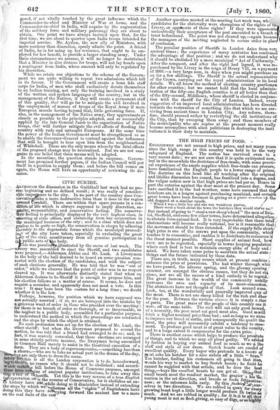CIVIC SUICIDE.
16L• THOUGH the discussion in the Guildhall last week had no pre- cise beginning and no defined result; it was really of consider- able impo lice to the city. In no part of the country does Con- leapt servatis ..ake a more destructive form than it does in the region around ornhill. There are within that space persons in a con- dition. pf life which is always supposed to imply discretion, sa- gacity, responsibility, and conservative feeling. The conserva- tive feeling is principally displayed by the very highest class, in sneering at civic offices, and abstainingfrom any cotiperation in the municipal business of the city; and in a class which does not prgess to be quite so high, the conservatism is shorn by adhering slavishly to the degenerate forms which the municipal proceed- s or-the city have taken, especially in excluding the great y of the civic constituency from all genuine participation in public acts ofilke body. his was peculiAlAillustrate-d by the scene of last week. The ery was assembled-to-elect the Sheriff, and. two candidates were proposed,—Alderman Abbiss and Mr. Lusk. A Liveryman in the body of the hall desired to be heard on some question con- nected with the election of the candidates, and with the subject of such elections generally. He was told that he was "out of order," while we observe that the point of order was in no respect cleared up. It was afterwards distinctly stated that when an Alderman desires to be Sheriff it is enough to propose him, and his election follows as a matter of course. It seems, he does not require e. seconder, and apparently does not need a vote. Is this true r It may have been the custom for a. long time ; we doubt whether it is the law.
Perhaps however, the position which we have supposed was not actually asserted; if so, we are betrayed into the mistake by a grievous want of order in those who presided over the meeting ; for there is no breach of order so thorough, or so inexcusable, as the neglect to a public body, assembled for a particular purpose, to understand the method in which the proceedings are conducted and the steps by which the object is attained. No such pretension was set up for the election of Mr. Lusk, the other sheriff; but when the liveryman proposed to second the motion, he was told that a friend had arranged to do so ; and, in fact, it was scarcely concealed, that these elections are arranged in some strictly private manner, the liverymen being assembled in Common Hall merely to assist in the theatrical execution of a form. They are a body of supernumeraries,—something less than
.--.. a chorus,—who are to take no actual part in the drama of the day, .,11114 t are only there to dress the scene.
ir Is is all the London corporation is to do henceforward, ing to tb c no reason' why it should not be abolished; and accord- waich mai( e bill before the House of Commons proposes, amongst these later e.otains of ancient popular institutions, to take away this ti rta± or leriffs. Yet this is the very reverse of a true English i erpretation mi.-, the reverse of Conservative, for it abolishes an an-
history have ass-Jrhile doing so it diminishes instead of extending the steps by which we hereas all the " ' ts" of Englishmen have doing this they have actk7jng forward ancient law to e. more on the real facts of the caw Another question mooted at the meeting last week was, wh candidates for the shrievalty were champions of the rights of tu• Livery, or oppohents of those rights? If they were opponentsjj
undoubtedly their acceptance of the post amounted to a breach o , trust beforehand. The point was not cleared up,—again becaue 1 the managers of the meeting neglected to secure order in plac I of confusion.
The peculiar position of Sheriffs in London dates from very ancient times ; the experience of many centuries has confirmed the advantage of that position ; and we do not understand why it should be abolished by a mere municipal "Act of Uniformity." After the conquest, and after the right had lapsed, it was re- purchased by the Livery in the reign of Henry VII, on a payment of 3001.—a very large sum, in days when you might purchase an ox for a few shilling's. The Sheriff is the actual representative of the Crown, carrying out the royal administration in its local details. We all know the method of electing country gentlemen for other counties ; but we cannot hold that the local adminis- tration of the fifty-one English counties is at all better than that of the fifty-second, Middlesex, whose sheriff is elected in conjunc- tion with the sheriff for the City of London. Indeed, every suggestion of an improved local administration has been directed towards the restoration of something like that which we see sur- viving from ancient times in London City, Any reform there- fore, should proceed rather by revivifying the old institutions of the City, than by sweeping them away ; and those members of the municipality who are supine at the present moment really become accomplices with alien politicians in destroying the insti tutions it is their duty to maintain.


























 Previous page
Previous page